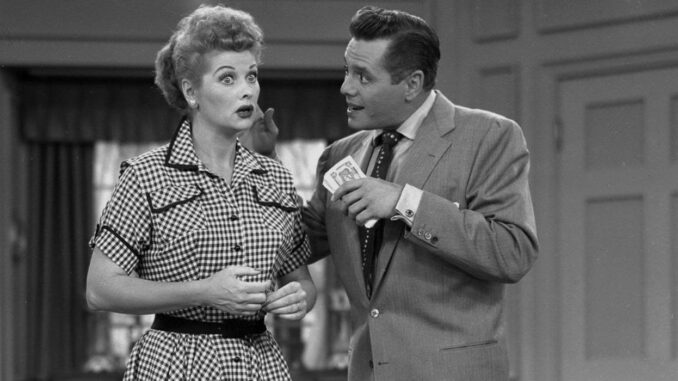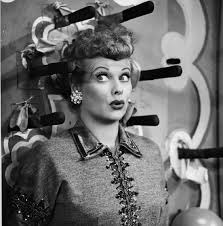
Introduction: Could Lucy Ricardo’s Charm Mask a Dark Past?
When you think of I Love Lucy, it’s hard not to picture the quirky redhead Lucy Ricardo getting herself into comical messes. But what if her playful antics and over-the-top schemes were masking something much deeper—and much darker? A fan theory suggests that Lucy Ricardo’s zany behavior might stem from a disturbing and traumatic past. Intrigued? Let’s dive into this compelling take on one of TV’s most beloved characters.
The Origins of the Fan Theory
Every great theory starts with a question: Why is Lucy Ricardo the way she is? Fans of the show began piecing together clues from Lucy’s behavior, her interactions with others, and her occasional slips of vulnerability. While the sitcom was meant to entertain, some argue that Lucy’s antics hint at a darker backstory.
The Case for Lucy’s Troubled Past
1. Lucy’s Over-the-Top Schemes: Cry for Help or Need for Attention?
Why does Lucy constantly chase after fame and adventure? Psychologists might call this attention-seeking behavior a response to feeling overlooked or undervalued in the past. Could Lucy Ricardo have endured a childhood where she was ignored or overshadowed?
2. A Fear of Being Alone
Have you noticed how Lucy clings to Ricky, even during their arguments? Her fear of abandonment could hint at a history of loss or rejection. Some fans believe this points to a past where Lucy was left on her own, forcing her to develop her dramatic and resourceful personality.
Clues Hidden in the Episodes
3. Lucy’s Backstory Is Mysteriously Vague
The show never delves deeply into Lucy Ricardo’s past. Unlike Ricky, whose Cuban heritage and musical career are explored, Lucy’s background is skimmed over. This gap has fueled speculation about what secrets her character might be hiding.
4. Her Obsession with Being in the Spotlight
In numerous episodes, Lucy dreams of becoming a star. Some interpret this as a desire for validation—a need to prove her worth to those who doubted her in the past.

Psychological Insights Into Lucy Ricardo
5. The Role of Humor in Coping
They say laughter is the best medicine, and for Lucy, it might have been a survival mechanism. Her comedic timing and knack for turning disastrous situations into laughs could be her way of dealing with unresolved trauma.
6. Impulsive Behavior as a Defense Mechanism
Lucy’s tendency to act first and think later often gets her into trouble. While it’s hilarious on-screen, psychologists suggest impulsivity can stem from a history of instability or unpredictability in one’s life.
The Darkest Theory: Lucy’s Secret Life Before Ricky
7. Was Lucy Running From Something?
Some fans speculate that Lucy Ricardo might have had a troubled life before meeting Ricky. Could she have left behind a shady past or escaped a traumatic event? The theory gains traction when you consider her eagerness to settle into a new identity as Mrs. Ricardo.
8. The Role of Ricky in Her Redemption
Fans argue that Ricky might symbolize stability in Lucy’s chaotic world. He represents the life she desperately wants—a life free from whatever darkness she’s left behind.
Counterarguments: Is This Theory Too Far-Fetched?
9. It’s Just a Sitcom!
Critics of the theory point out that I Love Lucy was never meant to be dissected so deeply. Its purpose was to make people laugh, not to suggest deeper psychological layers.
10. The Comedy Context
Many of Lucy’s quirks and schemes align with the slapstick humor of the era. Could it simply be that her behavior was written to entertain rather than hint at a deeper story?
Why This Theory Resonates With Fans
11. Adding Depth to a Beloved Character
Fans love theorizing because it allows them to see their favorite characters in a new light. Lucy Ricardo, as a complex figure with a hidden past, becomes even more fascinating.
12. The Appeal of Mystery
People are naturally drawn to mysteries. The idea that there’s more to Lucy than meets the eye keeps fans engaged and curious about the character.
What the Cast and Creators Have Said
13. Did Lucille Ball Intend for Lucy to Be Mysterious?
While Lucille Ball never hinted at a dark backstory for her character, her own life was filled with challenges and triumphs. Some fans wonder if Ball’s real-life struggles subtly influenced Lucy’s character.
14. Writers Focused on Comedy, Not Complexity
The writers of I Love Lucy prioritized humor over character development. However, this lack of depth might have unintentionally left room for fans to craft their own interpretations.
Why This Fan Theory Endures
15. The Timelessness of ‘I Love Lucy’
Even decades after its original airing, I Love Lucy continues to captivate audiences. This theory breathes new life into the show, proving its cultural relevance and inviting a fresh wave of curiosity.
Conclusion: Lucy Ricardo—A Character With Layers
Whether you believe the theory or not, it’s undeniable that Lucy Ricardo is one of the most iconic TV characters of all time. Her comedic genius and larger-than-life personality have left an indelible mark on pop culture. But if there’s one thing this fan theory teaches us, it’s that even the brightest smiles might hide untold stories.
FAQs
1. What inspired this fan theory about Lucy Ricardo?
Fans started piecing together clues from Lucy’s behavior, leading to speculation about a deeper backstory.
2. Did Lucille Ball intend for Lucy Ricardo to have a dark past?
There’s no evidence to suggest Lucille Ball or the writers crafted such a backstory, but fans enjoy interpreting it this way.
3. Why do fans believe Lucy was running from something?
Her mysterious backstory and intense need for validation sparked theories about a troubled past.
4. Is there any episode that hints at Lucy’s dark history?
While no episode explicitly addresses this, her exaggerated schemes and emotional moments fuel speculation.
5. Why does this theory resonate with so many fans?
It adds depth and intrigue to a beloved character, making her feel more relatable and multi-dimensional.